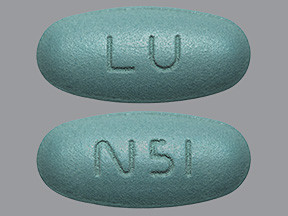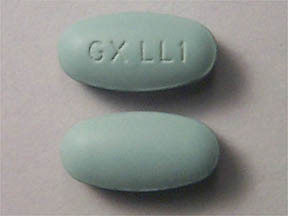ABACAVIR/LAMIVUDINE/ZIDOVUDINE - ORAL
PHONETIC PRONUNCIATION: (a-BAK-a-vir/la-MIV-ue-deen/zye-DOE-vue-deen)
COMMON BRAND NAME(S): Trizivir
GENERIC NAME(S): abacavir sulfate/lamivudine/zidovudine
Uses
USES: This product contains 3 drugs: abacavir, lamivudine, and zidovudine. It is used alone or with other HIV medications to help control HIV infection. It helps to decrease the amount of HIV in your body so your immune system can work better. This lowers your chance of getting HIV complications (such as new infections, cancer) and improves your quality of life. Abacavir, lamivudine, and zidovudine all belong to a class of drugs known as nucleoside reverse transcriptase inhibitors (NRTIs). Abacavir/lamivudine/zidovudine is not a cure for HIV infection. To decrease your risk of spreading HIV disease to others, do all of the following: (1) continue to take all HIV medications exactly as prescribed by your doctor, (2) always use an effective barrier method (latex or polyurethane condoms/dental dams) during all sexual activity, and (3) do not share personal items (such as needles/syringes, toothbrushes, and razors) that may have contacted blood or other body fluids. Consult your doctor or pharmacist for more details.
How to use ABACAVIR/LAMIVUDINE/ZIDOVUDINE - ORAL
HOW TO USE: Read the Medication Guide and Warning Card provided by your pharmacist before you start taking abacavir/lamivudine/zidovudine and each time you get a refill. Carry the Warning Card with you at all times. If you have any questions, ask your doctor or pharmacist. Take this medication by mouth with or without food, usually twice daily or as directed by your doctor. Take this medication with a full glass of water (8 ounces/240 milliliters) unless your doctor directs you otherwise. Because this combination product has fixed doses of abacavir, lamivudine, and zidovudine, it should only be used if your doctor has determined that the doses of all 3 medications in this product are right for you. If you stop taking any medication containing abacavir even for a short time and then restart the drug, you have an increased chance of developing a very serious (possibly fatal) allergic reaction. Refill your medication before you run out. Do not stop treatment unless directed by your doctor. Before restarting any medication containing abacavir, consult your doctor or pharmacist, and be sure you have easy access to medical care. It is very important to continue taking this medication (and other HIV medications) exactly as prescribed by your doctor. Do not skip any doses. Do not increase your dose, take this drug more often than prescribed, or stop taking it (or other HIV medicines) even for a short time unless directed to do so by your doctor. Skipping or changing your dose without approval from your doctor may cause the amount of virus to increase, make the infection more difficult to treat (resistant), or worsen side effects. For the best effect, take this medication at evenly spaced times. To help you remember, take this medication at the same times every day.
Side Effects
Precautions
Interactions
Overdose
Images

- color
- blue-green
- shape
- oblong
- imprint
- LU, N51
Reviews
Faq for ABACAVIR/LAMIVUDINE/ZIDOVUDINE - ORAL
- ABACAVIR/LAMIVUDINE/ZIDOVUDINE is used to treat HIV infection. It is a combination of three drugs that helps to control and reduce the growth of the virus.
- Take this medication by mouth as directed by your doctor, usually twice a day. It may be taken with or without food. It is important to take this medication regularly to get the most benefit from it.
- Some common side effects may include nausea, headache, diarrhea, dizziness, and trouble sleeping. Seek immediate medical attention if you experience severe allergic reactions, severe dizziness, rapid heartbeat, or signs of liver problems.
- It is recommended to avoid alcohol consumption while taking this medication as it may increase the risk of liver toxicity.
- If you miss a dose, take it as soon as you remember. If it is near the time for your next dose, skip the missed dose and resume your regular dosing schedule. Do not double the dose to catch up.
- This medication may cause a serious allergic reaction. It is important to immediately inform your healthcare provider if you experience symptoms like fever, rash, nausea, fatigue, or sore throat. Additionally, it may also cause a decrease in certain blood cells, so regular blood tests may be required.
- It is important to discuss the risks and benefits with your doctor before using this medication during pregnancy or breastfeeding. It may be recommended in certain situations, but it is best to consult with a healthcare professional.
Warning
WARNING: In some patients, the abacavir in this product has caused a serious (sometimes fatal) allergic reaction. Your doctor should order a blood test to measure your risk before you start this medication or take it again. If the blood test shows you are at greater risk, you should not take this medication and your doctor should discuss other treatment choices with you. Symptoms of an allergic reaction may include any of the following: rash, itching/swelling (especially of the face/tongue/throat), severe dizziness, trouble breathing, fever, extreme tiredness, nausea, vomiting, diarrhea, stomach pain, muscle aches, sore throat, mouth sores, or cough. Get medical help right away if you experience any of these symptoms. If you have stopped taking abacavir because of an allergic reaction, you must never take any form of abacavir again, or death could result. Tell all of your doctors and pharmacists if you have stopped taking abacavir due to an allergic reaction. Also, properly throw away any unused medications containing abacavir. Read the warning card provided with this medication for more details. The zidovudine in this product can decrease bone marrow function, which may lead to low numbers of red and white blood cells. A low number of red blood cells can lead to anemia. A low number of white blood cells can decrease your body's ability to fight serious, life-threatening infections. These serious side effects occur more frequently in people with advanced HIV disease (AIDS). Get medical help right away if you develop any signs of anemia (such as unusual tiredness, fast breathing, pale skin, fast heartbeat) or signs of infection (such as fever, chills, cough, persistent sore throat). Your doctor will check your blood cell counts while you are taking this medication to decrease the risk of these side effects. Zidovudine may also cause muscle problems. Get medical help right away if you develop signs of muscle problems (such as wasting or decrease in muscle size, weight loss, muscle weakness/pain/tenderness). Rarely, abacavir/lamivudine/zidovudine has caused severe (sometimes fatal) liver problems and a certain metabolic problem (lactic acidosis). Get medical help right away if you develop any of the following symptoms: nausea, vomiting, stomach/abdominal pain, unusual tiredness, dark urine, yellowing eyes/skin, deep/rapid breathing, or drowsiness. These serious side effects may occur more often in women and obese patients. If you have hepatitis B infection and HIV, you may have a serious worsening of hepatitis symptoms if you stop taking lamivudine. Talk with your doctor before stopping this medication. Your doctor will monitor liver tests for several months after you stop lamivudine. Get medical help right away if you develop symptoms of worsening liver problems.
Disclaimer
IMPORTANT: HOW TO USE THIS INFORMATION: This is a summary and does NOT have all possible information about this product. This information does not assure that this product is safe, effective, or appropriate for you. This information is not individual medical advice and does not substitute for the advice of your health care professional. Always ask your health care professional for complete information about this product and your specific health needs.

No Reviews Yet